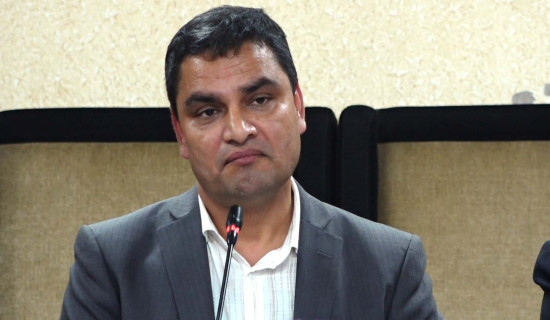- Monday, 16 February 2026
Pesticides sprayed from the drone, farmers of Chitwan excited with mechanisation
By Our Correspondent Chitwan, June 6: The mechanisation introduced in the agricultural sector of Chitwan has created enthusiasm among the farmers.
After the Prime Minister Agriculture Modernisation Project started the work from sowing paddy from an automatic machine to spraying pesticides from drones, the farmers here are excited about agriculture. This will also reduce the production cost.
The new technology and mechanisation introduced here along with the collective and land consolidation farming system has started attracting the youth towards agriculture.
Madhab Paudel, information officer of the Prime Minister Agriculture Modernisation Project Implementation Unit, Chitwan, said that technology and mechanisation in agriculture are needed to make agriculture commercial from existing subsistence one.
The PMAMP has already provided agriculture inputs in subsidy for the paddy zone for planting paddy with machines and this time the drone has been procured under the leadership of the project to spray pesticides, he said.
According to him, the drones were procured with the investment of 15 per cent of the Youth Modern Collective Farming Group and 85 per cent of the project. The cost of the drone is Rs. 1,525,000.
Farmers usually spend 20 tanks of pesticides per bigha of land from hand tools, but when using a drone a tank of the same quantity is enough for spraying pesticide in a bigha of land. Paudel said, "This technology is very important and suitable as it reduces the risk and cost as well." However, this sometimes used technology is impossible for farmers to invest. Therefore, the state should invest in such equipment.
For the first time in Nepal, pesticides have been used in Chitwan using unmanned drones.
Tests for spraying pesticides from drones have been used in paddy fields of East Chitwan and vegetables and papaya fruits in West Chitwan.
Although the test was successful, due to lack of technicians, it is not possible to spray the pesticide at any time even if desired.
Currently, only engineers from the National Innovation Centre are experts in this field. According to Poudel, the project has already started training to produce technicians.
Chief of the Prime Minister Agriculture Modernisation Project Implementation Unit, Chitwan, Dhan Bahadur Thapa said that the use of drones would reduce the production cost and increase the production of paddy.
He claimed that the technology is suitable as its use also reduces the risk of poisoning in human health.
Thapa said that he had to request the farmers to plant paddy from the rice planter last year but this year the farmers have demanded rice planters themselves. “This time, the use of drones started in paddy and vegetables. Its achievement will be seen in a short time. If it is good, I am thinking of purchasing more drones and making them available to the farmers.”
Suman Subedi, director of the Youth Modern Collective Farming Group, claimed that technology is important because it saves time, reduces damage to human health and reduces the quantity of pesticides.
He said, “The cost could be reduced by half if land was consolidated and mechanised in agriculture. However, since the cost of mechanisation is very expensive and sometimes used, I think the state should invest more in it.”
He said that preparations are being made to spray pesticides on more than 100 bighas of vegetables in the vegetable zone of Chitwan.
Surya Bahadur Bogati, a farmer from Khairhani who had sprayed pesticides in a paddy field with a drone, said that this technology is important for farmers. He said that around three/four days had to be taken for spraying pesticides by using hand technology before this.
















